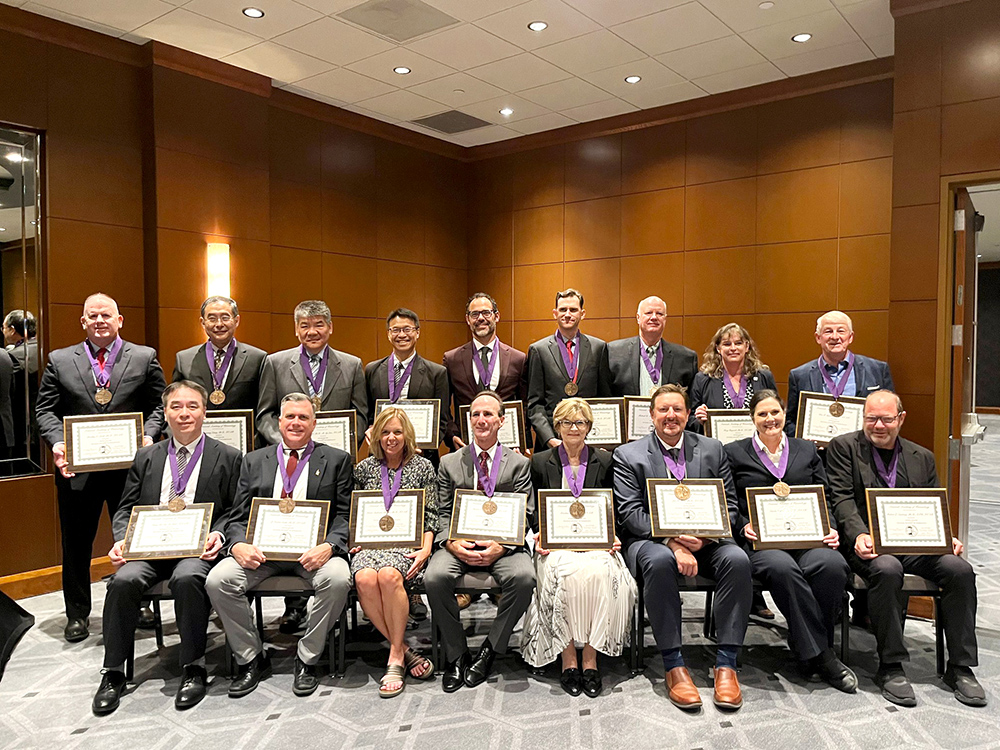
Prof. Tung-Wu Lu elected US National Academy of Kinesiology Fellow
瀏覽器版本過舊,或未開啟 javascript
請(qǐng)更新瀏覽器或啟用 javascript
Spotlights
A Cross-Disciplinary Historian: Prof. Jo-shui Chen.
Literary Men and Intellectual Transformations in Tang China (Revised and Enlarged Edition) (Taipei: NTU Press, 2016).
A Tang woman’s portrait excavated in Turpan.
A Tang epitaph for a woman.
Prof. Jo-shui Chen (陳弱水), Distinguished Professor of History and Chair Professor at NTU, has committed himself to historical studies for more than 30 years. His main research areas include the history of the Sui, Tang, and Five dynasties (6th–10th centuries) and Chinese intellectual history of the medieval and modern periods. Prof. Chen’s scholarship is best characterized by astute methodology. Well versed in European and Japanese histories, he is adept at using comparative approach to raise new questions and examine complex phenomena structurally. His attention to interdisciplinarity has also led him to develop and adopt groundbreaking methodologies (e.g., the use of unintentional historical data and role research) to uncover the neglected clues for reconstructing women’s culture and family life in Tang China
Intellectual History during the Transition from Tang to Song
Prof. Chen’s primary research area is intellectual history in the Sui-Tang dynasties, particularly the period between the mid-8th and late 9th centuries, centralizing on a critical historical change commonly known as “the Tang–Song transition” (roughly from the 8th–11th centuries). This period is one of the pivotal moments in Chinese history, which witnessed the inception of a new form of Confucianism and its development into cultural orthodoxy. When exploring the revival of Confucianism, Prof. Chen identified two dimensions of this cultural trend. One dimension is the revival of the traditional form of Confucianism that emphasized its function in bringing about a sound political order. The other posited that Confucianism should be the guiding principles regulating the human world as a whole. While the former represents the mainstream, the latter adds a tinge of innovation to this cultural trend.
Besides analyzing the ideas, Prof. Chen is also interested in the connection between ideas and society, with which he identifies the dynamics behind intellectual changes. Literati were highly regarded in the Tang dynasty, in which men of letters enjoyed high social status and had great cultural influence on society. In this context, the primary force of change in ideas does not derive from ideas themselves, but from literary writers’ advocacy of Confucian values. Prof. Chen has provided a nuanced and systematic explanation of the great intellectual transformation during the transition from Tang to Song, which is fully illustrated in Liu Tsung-yüan and Intellectual Change in T’ang China, 773-819 (Cambridge: Cambridge UP, 1992, 2006) and Literary Men and Intellectual Transformations in Tang China (Revised and Enlarged Edition) (Taipei: NTU Press, 2016).
Women's Culture and Family Life in the Sui-Tang Dynasties
In the field of social history, Prof. Chen focuses on the history of women and family in the Sui-Tang and Five dynasties, and published his findings in Women’s Culture and Family Life in Tang China (Taipei: Yun-chen, 2007). In the book, he examines the relationship between married women and their parental families along with other issues to delineate family life in the Tang dynasty.
This book has several key contributions. First, Prof. Chen draws on “unintentional historical data” to provide a more realistic portrayal of the life of women in the Tang dynasty. Usually, the validity of historical documents about women is difficult to assess due to the domination of normative concepts and the frequent use of abstract language in such documents. However, women’s parental families would not be prioritized among women’s obligations, and Tang writers were not burdened with the need to talk about them in moralistic terms. Therefore, by investigating the relationship between married women and their parental families, Prof. Chen is able to circumvent the two-fold problem and obtain more reliable data. In addition, this relationship reveals the multiple roles of women as wives, daughters-in-law, and daughters, which helps reconstruct a broader picture of the period.
Second, information about the private life more than one thousand years ago is rather scarce and obscure. To expand the range of data, Prof. Chen has consulted a large number of newly excavated epitaphs and compared them with realistic details from fictions. He has thus reconstructed a microcosm of the ancient world, which would come closest to the world most women of the period might have inhabited. Third, Prof. Chen explicates the significance of women’s life in this period by indicating how their actions were understood by contemporaries, how they aligned their conduct with received values and cultural symbols, and even how they invented new modes of conduct. All in all, this book presents how culture is enacted in an actual living situation. Women of the Tang dynasty were also active outside their families. During the first 50–60 years of the dynasty, women were deeply involved in court politics. The dynasty even witnessed the reign of the only empress in Chinese history.
More than 20 years ago, Prof. Chen commenced his study of Tang women and family, presenting groundbreaking questions and findings that have exerted great impact on the existing historical studies of Chinese women. The studies of women and family involve the deep structure of social culture, which usually undergoes gradual change over time. Prof. Chen’s research thus provides a vital window on the long-term evolution of Chinese society. In addition, Prof. Chen also extends his interest to some understudied but no less important social members, such as eunuchs, military men of Tang China, and aborigines in early southeastern China.
Cross-Interdisciplinary Perspectives and Methodologies
While emphasizing the importance of methodology, Prof. Chen also pays particular attention to the interrelations between disciplines. For example, religion and literature played predominant roles in the cultural scene of the Tang dynasty; as such, studies of Tang culture is normally the domain of literature and religion scholars and historians were seldom involved. Prof. Chen employs modern historical approaches to investigate the intellectual transformation in the mid-to-late Tang dynasty and to reconstruct the intellectual dynamism centered on literary and religious activities. In his research, Prof. Chen has incorporated several methodologies, including analysis of the thought of individuals, history of ideas, investigation on individual and collective mentality, social history of thought, history of scholarship, and studies on intellectual communities. When studying women’s history, Prof. Chen sets up a critical distance between the Tang dynasty and our time because he has noticed that gender consciousness featured less prominently in Tang women’s life than in contemporary women’s life. In addition, he has developed the approach of “role research,” which describes a method that uses the practical roles of women as a means to pore over their lives and families. This approach has proved to be influential to scholars and researchers of the next generation. Until now, there have been 477 doctoral dissertations and master’s theses in Taiwan that refer to his research results and methodologies.
The Concepts of “Gong” (public) and “Yi” (Righteousness, Justice) in the History of Ideas
In terms of the Chinese history of ideas, Prof. Chen extends his research scope from the Sui, Tang, and Five dynasties to the early Middle Ages (i.e., the Wei, Jin, Southern and Northern dynasties) and the modern period, investigating the diachronic development of several issues. For example, he wrote systematic and innovative expositions on the concepts of gong (public) and yi (with connotations including righteousness and justice) from a comparative historical framework in Public Consciousness and Chinese Culture (Taipei: Linking, 2005) and “The Evolution of ‘Public’ in Chinese History and Its Modern Transformation” (2011). In these two publications, the issues discussed include the nature and history of civic virtue, the conceptions of society in the popular culture of late imperial China, the concepts of “public” and “justice” in Chinese history, and the question of social ethics in modern Japan.
Historical studies require amassing, analyzing, and critiquing documents and historical incidents to present the verity, credibility, and accuracy of history. In a strict sense, historians do not stress historical incidents themselves; instead, they examine the historical context and reinterpret the implications of documents. In other words, historians have to interpret the past from multiple perspectives and assess it using appropriate methodologies and theories. Furthermore, because historical content and themes are always already cross-disciplinary and steeped in many fields, historians often need to play multiple scholarly roles. As an exemplar scholar specialized in various domains, Prof. Chen has produced outstanding and insightful works on a wide range of topics, including social history, transformation of ideas, and social structure. Moreover, he has developed novel questions and methodologies that open up new horizons and exert deep influence on the academia.

Prof. Tung-Wu Lu elected US National Academy of Kinesiology Fellow
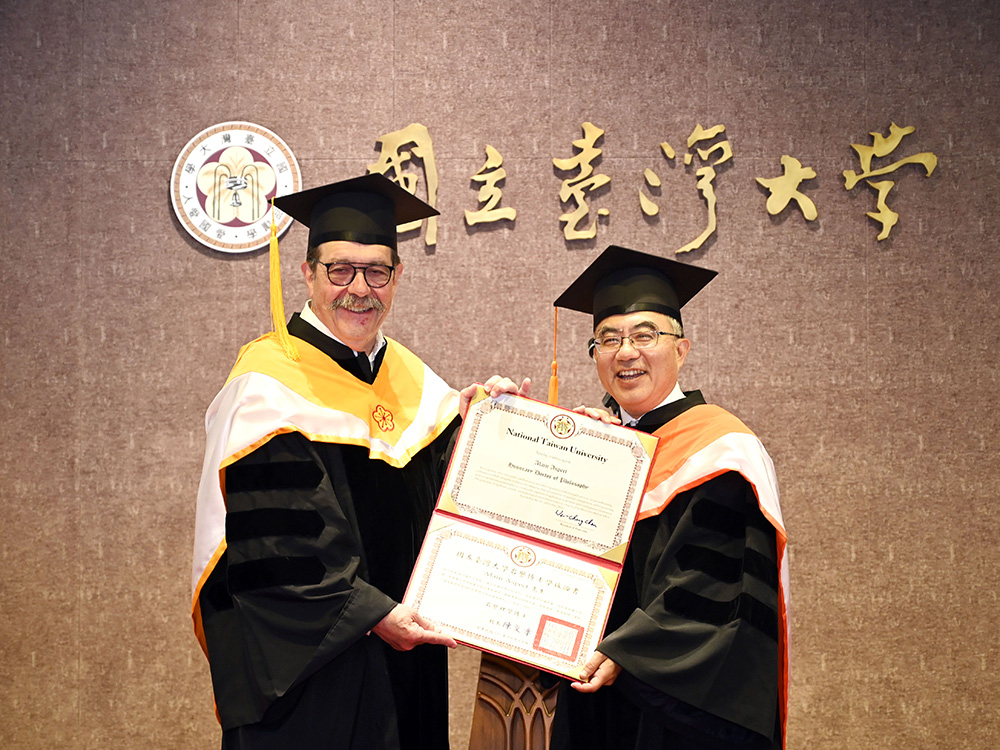
Nobel Laureate Alain Aspect awarded “NTU Honorary Doctorate” and “Raymond Soong Chair Professorship of Distinguished Research”
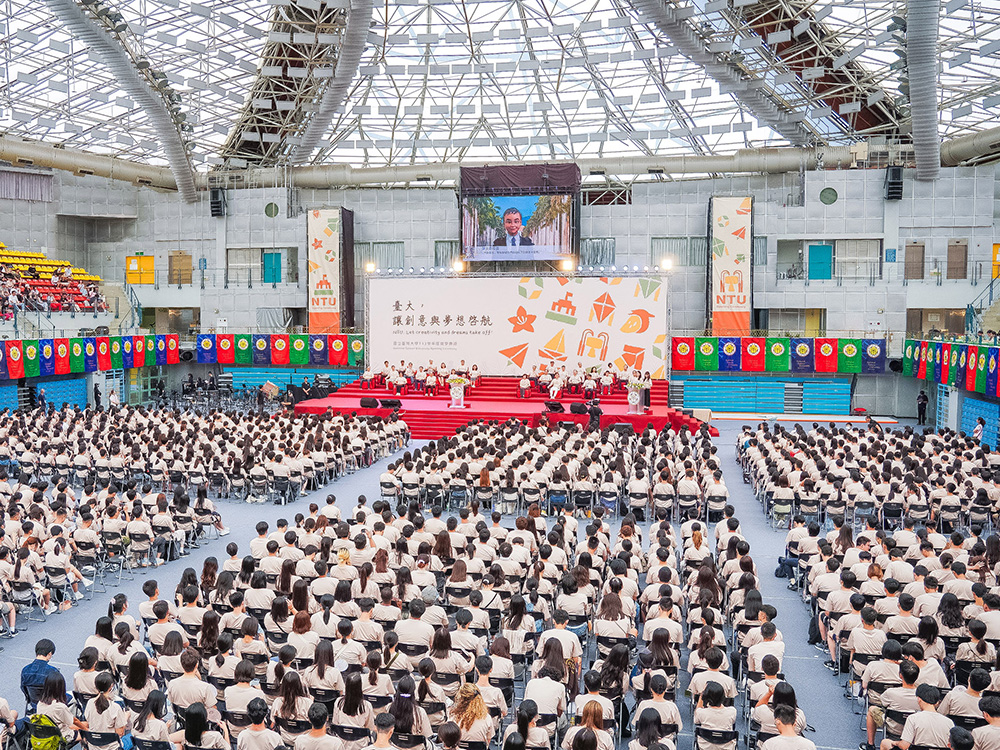
NTU Opening Ceremony: “Where Creativity and Dreams Take Flight”
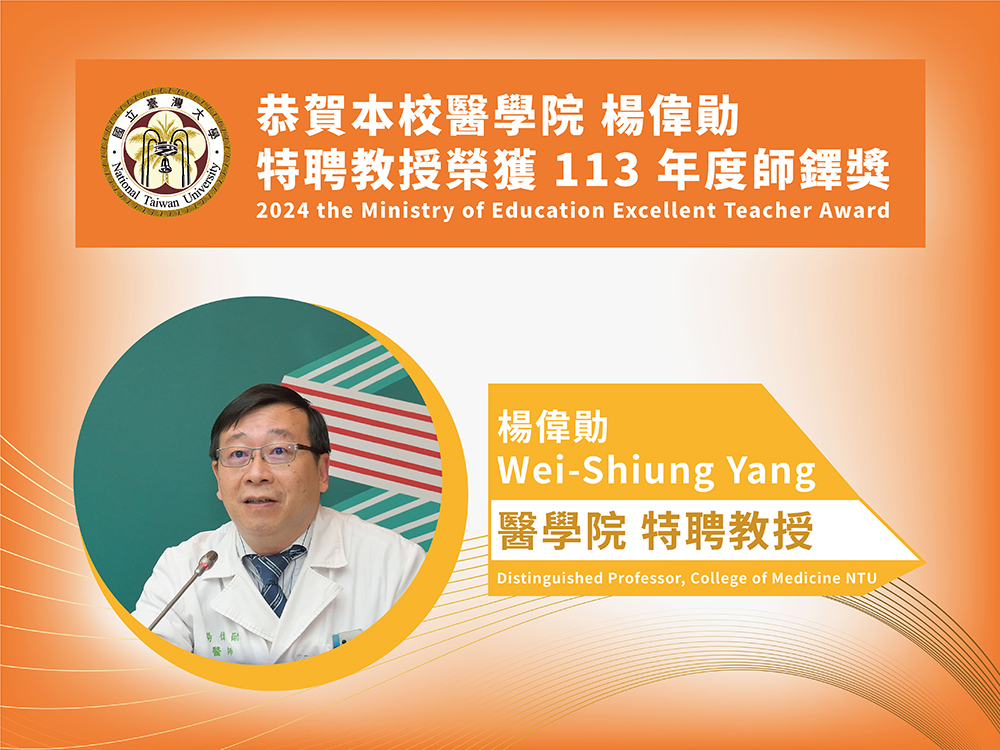
Prof. Wei-Shiung Yang wins MOE National Excellent Teacher Award
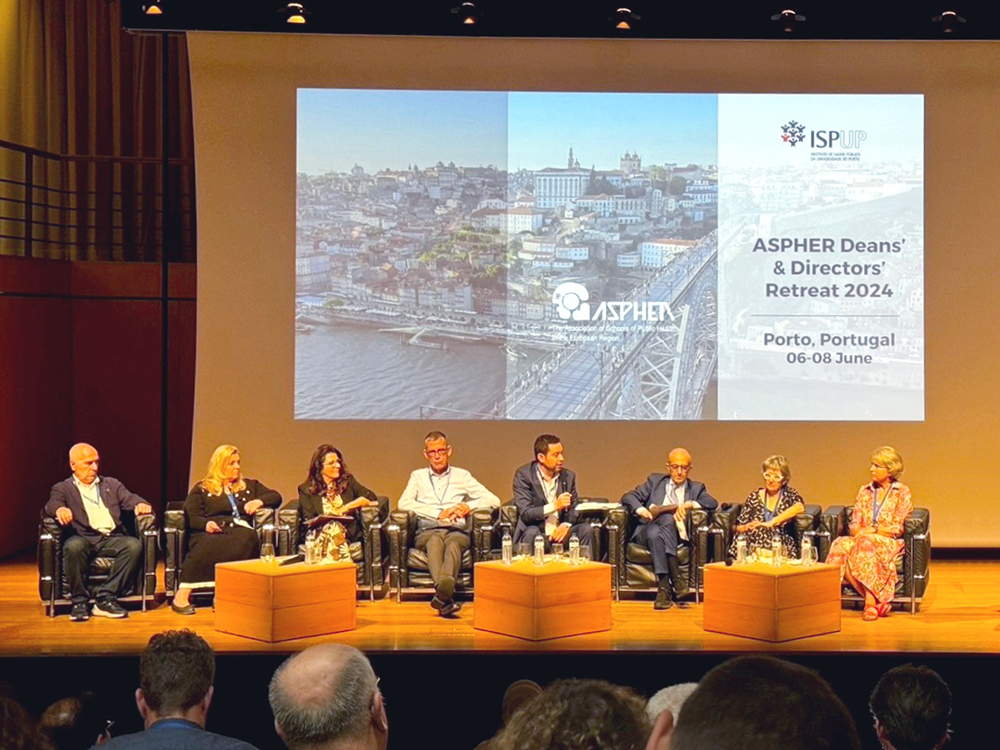
NTU College of Public Health's Global Health Program Joins the Association of Schools of Public Health in the European Region
Current Spotlights

Prof. Tung-Wu Lu elected US National Academy of Kinesiology Fellow

Nobel Laureate Alain Aspect awarded “NTU Honorary Doctorate” and “Raymond Soong Chair Professorship of Distinguished Research”

NTU Opening Ceremony: “Where Creativity and Dreams Take Flight”

Prof. Wei-Shiung Yang wins MOE National Excellent Teacher Award

NTU College of Public Health's Global Health Program Joins the Association of Schools of Public Health in the European Region